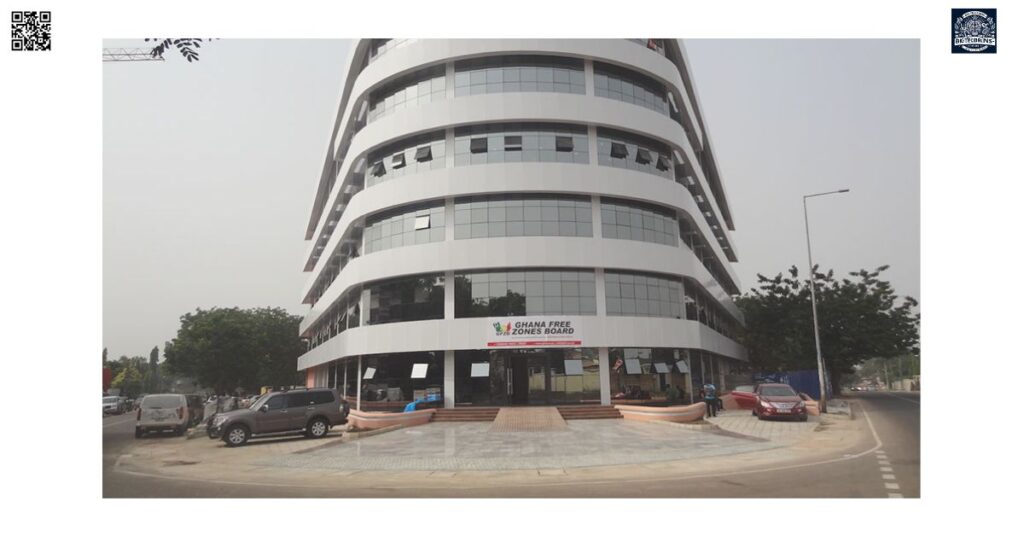Historical Overview
The Ghana Free Zones Authority (GFZA) was established in 1995 under the Ghana Free Zones Act, Act 504. The primary objective was to promote the processing and manufacturing of goods for export by creating an enabling environment for businesses. It forms part of Ghana’s broader strategy to attract foreign investment, create jobs, and enhance export earnings to diversify the economy from its reliance on traditional exports like cocoa and gold.
Operations
The GFZA facilitates the development and management of Free Zones in Ghana, offering incentives to businesses that qualify to operate under the program.
Key functions include:
Approving Licenses:
- Granting licenses to businesses that qualify as Free Zones Enterprises
Monitoring Compliance:
- Ensuring adherence to regulations governing Free Zones.
Promoting Investment:
- Marketing Ghana as an attractive investment destination for export-oriented businesses.
Facilitating Infrastructure Development:
- Overseeing the provision of necessary infrastructure for Free Zones.
Constitutional Backing
The GFZA operates under the Ghana Free Zones Act, 1995 (Act 504), which provides the legal framework for the establishment, governance, and operations of Free Zones in Ghana. While the Constitution of Ghana does not directly reference Free Zones, its economic and trade provisions support the broader goals of the GFZA.
Offices
The GFZA has several operational and administrative offices to manage its functions:
Head Office:
- Located in Accra, it serves as the administrative hub for policy and operational decisions.
Zonal Offices:
- Situated in key regions to coordinate activities within Free Zones.
One-Stop Service Center:
- Provides streamlined services to investors, including business registration, customs facilitation, and compliance support.
Leadership
The GFZA is governed by a Board of Directors, which oversees its strategic direction. The day-to-day operations are managed by an Executive Secretary.
Board Composition:
- Representatives from relevant government ministries (e.g., Trade and Industry, Finance).
- Private sector representatives with expertise in trade, investment, and industry.
Executive Leadership:
- The Executive Secretary is responsible for implementing the Authority’s policies and supervising staff.
How They Function
The GFZA operates as a semi-autonomous regulatory and promotional body. Its core activities involve:
Regulating Free Zones Enterprises:
- Ensuring enterprises comply with operational guidelines
Incentive Provision:
- Offering tax holidays, exemptions on import/export duties, and repatriation of profits.
Investor Relations:
- Acting as a liaison between investors and the government.
Overseers
The GFZA operates under the Ministry of Trade and Industry, which provides policy direction. Additionally, it collaborates with other government agencies like the Ghana Revenue Authority (GRA) and the Ghana Immigration Service (GIS).
Method of Appointments
President of Ghana in consultation with the Council of State, appoints the GFZA Board and key leadership positions. These appointments typically follow constitutional and statutory guidelines to ensure competence and representation.
Offices and Institutions That Work Under or With GFZA
Several institutions collaborate with the GFZA to streamline operations:
Ghana Investment Promotion Centre (GIPC):
- Works on investment promotion.
Customs Division of Ghana Revenue Authority:
- Facilitates duty exemptions and customs processes.
Environmental Protection Agency (EPA):
- Ensures environmental compliance within Free Zones.
Ghana Export Promotion Authority (GEPA):
- Supports export-related initiatives.
References
- Ghana Free Zones Act, 1995 (Act 504).
- Available through Ghana’s legal archives.Official website: www.gfza.gov.gh
- Ministry of Trade and Industry reports and publications.
- Scholarly articles on Ghana’s Free Zones policy and economic diversification efforts, such as those in the African Economic Outlook journal.

